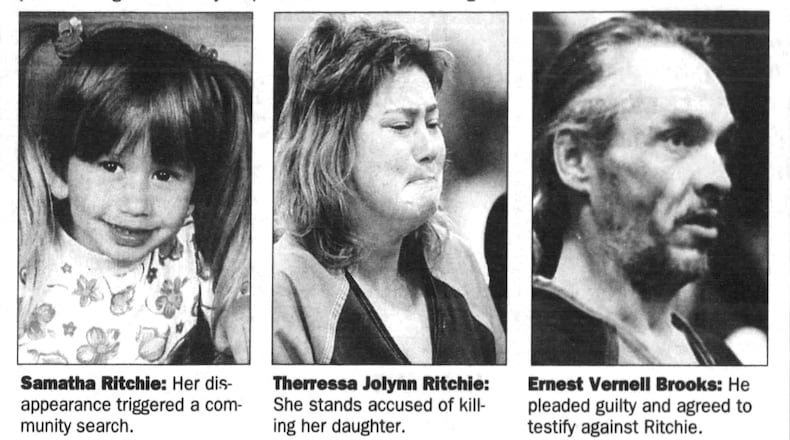911 call
After Ritchie called 911 on July 18, 1995, much of the Dayton community helped look for the missing girl. Police, friends, neighbors and volunteers searched for Samantha.
The night before Samantha was reported missing, she knocked on the door of neighbor Vicki Hammond’s house at around 1:30 a.m.
“I said, ‘Sam, go home.’ She went out the door. I wasn’t dressed, so I couldn’t follow her,” Hammond said at the time.
The girl was reported missing at 11 a.m. the next morning.
For four days that summer, while the search continued, Ritchie made anguished pleas for Samantha’s return.
“I’m going to lose it if I don’t get her back. That baby is my life,” Ritchie said.
Samantha was the daughter of Therressa Jolynn and Denton Ritchie. The couple had divorced a month before Samantha was reported missing.
“That’s my only child. It’s driving me crazy not knowing where she is,” said Denton, who was a Gulf War veteran and drove a waste collection vehicle.
By the fourth day of the search, one police theory was that someone had taken the girl.
“If anyone took her they better bring her back because I’m the best mother in the world,” Ritchie said.
Search dogs eventually found Samantha’s body submerged in a water-filled pit at the abandoned GHR Foundry, which was at 400 Detrick St., just blocks from Ritchie’s home on East Herman Avenue in Dayton’s McCook Field neighborhood.
Two weeks later, on the night of Aug. 3, Dayton police Chief Ronald Lowe Sr. announced that Ritchie had confessed to the girl’s slaying.
“At 10:15 p.m. Ritchie confessed to the death of Samantha Ritchie,” Lowe said. “Another arrest was made. Both were charged with murder.
The other suspect was Ernest Vernell Brooks, a cousin of Ritchie’s boyfriend, Arlie “Junebug” Williams.
Trial
Ritchie’s trial was said to be Montgomery County’s first trial televised gavel-to-gavel.
On the first day, 80 people jammed the courtroom, which had a listed capacity of 50. Viewers and readers were fascinated by the story.
The fascination turned to anger when the public learned that Ritchie had been charged with beating the girl to death, then dumping the body in a water-filled pit at an abandoned factory.
Prosecutors said after a night of heavy partying, Ritchie struck her daughter with a cast on her arm and killed her.
Brooks testified he and Ritchie were having sex in the basement of Ritchie’s home when the girl interrupted them. Ritchie, who had a broken arm, struck the girl in the head with the cast, then used a wrench to injure her skull.
Brooks, who testified that he helped Ritchie hide Samantha’s body, pleaded guilty to three charges: obstructing justice, tampering with evidence and gross abuse of a corpse.
Judge Kessler sentenced Brooks to the maximum sentence of five years in prison.
Ritchie did not testify during her trial.
The verdict
After five hours of deliberations, a Montgomery County Common Pleas jury convicted Ritchie of murder, gross abuse of a corpse, two counts of tampering with evidence and two misdemeanors: making a false alarm and inducing panic.
Judge John W. Kessler sentenced Ritchie to 20.5 years to life in prison.
“I will say that the community is outraged by these brutal, cruel and cowardly acts against a 4-year-old child,” Kessler said. “I will say that the offender who committed this crime is depraved, sub-human, not fit for inclusion in a civilized society.”
Ritchie maintained she was innocent after her conviction.
“I understand I’ve been wrongly accused of these charges,” Ritchie said after the verdict. “Do not just put me in a corner and let that person that done this to my daughter go free.”
Parole
Richie was first up for parole in 2010.
After serving 15 years, Richie begged for parole in a closed hearing. However, thousands of people signed a petition opposed her early release, and parole was denied.
Richie’s next parole hearing was in 2020, and she was once again denied. Her next parole hearing will be in 2030.
About the Author













